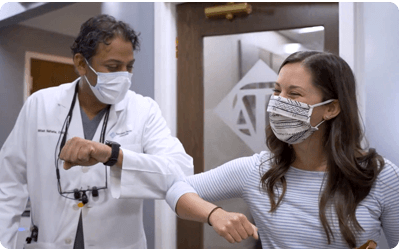We often describe dentistry as the perfect combination of science and artistry.
Dentists frequently promote the artistic aspects of treatments such as dental implants because we live in an image-driven society, but there is a fascinating science behind implants that is worth understanding. After all, it is the scientific aspects of dental implants that make them the next best thing to your natural teeth.
Read on to learn how scientific advancements have provided a permanent solution to one or more missing teeth.
What is a Dental Implant?
Implants replace the root of a missing tooth and hold a ceramic tooth that is made to match and blend perfectly with your surrounding natural teeth. The implant anchors the new tooth securely in place so you can smile and laugh with confidence. Having an implant means you can once again eat all your favorite foods without worries or pain.
There are three parts to a dental implant:
- Implant or Fixture – this portion literally acts as the tooth root. It is the portion that integrates itself into the jawbone.
- Abutment – this appliance connects to the fixture and supports the crown that replaces the missing tooth.
- Crown – this dental restoration is cemented to the abutment. It looks, functions and feels like your natural teeth.
There is sound science for dental implants, which have been used in dentistry for nearly 40 years. Dental implants have the highest success rate – between 94 and 98 percent – of any implanted surgical device. That is due in part to the evolution of the materials and procedures used, says Dr. Nitish Nahata.
“The implants we use today are more predictable, and we have better control over the outcome,” Dr. Nahata says. “The fact that they also last longer makes them a more palatable option for patients.”
Titanium is among the materials of choice for today’s dental implants in part because it can remain in place for more than 30 years and it doesn’t interact negatively with bone or gums. Zirconium is another popular implant material, particularly for patients with metal allergies. It belongs to the same chemical group in the periodic table as titanium.
Once a dental implant is placed, the bone surrounding it actually grows into the threads of the implant, making it a permanent part of your mouth. Dental implants typically are placed in a single sitting. While sometimes crowns can be placed onto the implant fairly quickly, most implants require three to six months to become fully integrated into the surrounding bone before the permanent crown can be installed. The implant’s eventual strength and appearance is enhanced by the developing structural and functional connection between the dental implant and the living bone.
It is worth underlining that osseointegrated implants—those given time to fully integrate into the bone—are the most successful and commonly used type of dental implant. Though there are a few situations in which a crown can be finished sooner, we have found that the strongest, most long-lasting implants take time to anchor and heal.
During the waiting period for the implant to reach its full strength and integration into the bone, a temporary prosthetic can be used to replace a missing tooth. We will never let you leave without a front tooth!
Using dental implants to restore a missing tooth also serves a greater function: it promotes a healthy jawbone. When you lose a tooth, the part of your jawbone that used to support your tooth begins to degenerate, in part due to a lack of stimulation from chewing in that area. Placing a dental implant preserves that stimulation and therefore prevents the loss of bone that usually accompanies a missing tooth.
Our goal here at Tewksbury Dental Associates is to keep your teeth healthy so they will last as long as you need them. However, when disease or trauma claims one or more of your teeth, it is good to know there is a treatment that provides a permanent solution to your problem.
Please call our office today to schedule an appointment and learn more about dental implants: (978) 851-7890.






